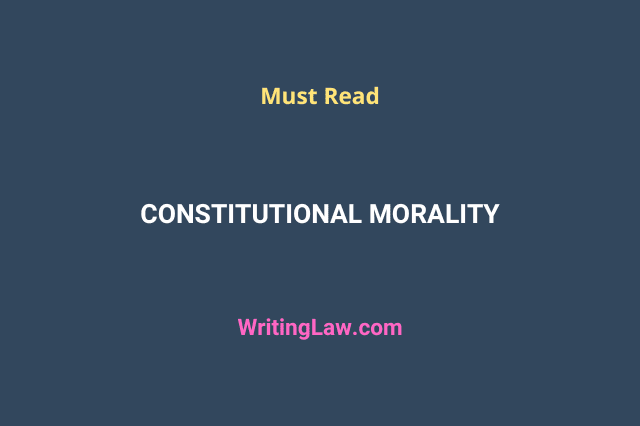
Constitutional morality is the concept that primarily ascertains the deep and humble abiding force towards constitutional values. It also refers to the positive aspects of the Constitution along with its substantive teachings. The concept of constitutional morality promotes the implementation of primary ideals adopted by the Constitution.
This article talks about the principle of Constitutional Morality, which has been highly used and interpreted by the Supreme Court in various judgements in the past decade.
Constitutional Ideals Being Part of Constitutional Morality
The elements of constitutional morality are the supreme ideals and important concepts mentioned in the Constitution and thus include the rule of law, the procedure established by law, due process of law, social justice, individual liberty, right to equality, right to freedom and the Preamble.
Analysis of the Concept of Constitutional Morality
The term constitutional morality has not been succinctly (clearly) defined in either the Constitution or by the Supreme Court. Thus, it keeps the principle open to a wide range of interpretation and analysis.
The idea of constitutional morality was discussed by Dr BR Ambedkar (mentioning the phrase first used by George Grote) during his speech, ‘The Draft Constitution‘, as the principle promoting a cordial liaison between the governing and the governed. According to him, the state should run in an unbiased manner, thus, ending any form of social injustice, and all this can be done with the avid implementation of the principles of constitutional morality.
Cordial: friendly.
Liaison: communication or cooperation which facilitates a close working relationship between people or organisations.
The idea of constitutional morality also goes against the idea of popular morality or authoritarian view. Although the Supreme Court in Navtej Singh Johar vs Union of India, while citing the principle of constitutional morality, said that ‘majoritarian views, popular morality cannot dictate constitutional rights‘.
Criticism of the Concept of Constitutional Morality
As the term constitutional morality gravely hints at the idea of strict implementation of constitutional principles, thus, sometimes it is considered to be a source of judicial overreach and goes against the principle of separation of power.
It has been criticised that the Supreme Court often enters the arena of legislature and functions beyond its assigned power while implementing the idea of constitutional morality. The Supreme Court, in its Sabrimala judgement as well as the present Attorney General of India, K.K. Venugopal called the doctrine of constitutional morality a dangerous doctrine.
Cases Mentioning the Principle of Constitutional Morality
The principle of constitutional morality has been vividly used in the Supreme Court judgements after 2014.
These are some prominent cases in which the term constitutional morality has been used and interpreted by the Supreme Court:
- Manoj Narula vs Union of India
- Indian Young Lawyers Association vs the State of Kerala
- Navtej Singh Johar vs Union of India
- Sri Subhas Bhattacharjee vs the State of Tripura
- The Trustee vs the State of Kerala, etc.
Conclusion
It can be said that the principle of constitutional morality is a highly debated principle in India.
A limited and within-the-scope implementation of constitutional morality can produce highly beneficial results upholding the essence of justice. On the other hand, it has a great capacity to be misused as well.
Thus, we can conclude that a clear definition of the term and a firm boundary limit of its use are the basic requirements at present.
Read Next:
1. What Is the Mini Constitution of India and Changes It Added
2. 10 Constitutional Provisions That Guarantee Independence of Supreme Court
- Meaning of Substantive Law and Procedural or Adjective Law - 19th March 2023
- What Are the Changes Made By the Medical Termination of Pregnancy Amendment Act of 2021? - 19th March 2023
- What Are the Changes Proposed by Draft Indian Telecommunication Bill, 2022? - 19th March 2023







